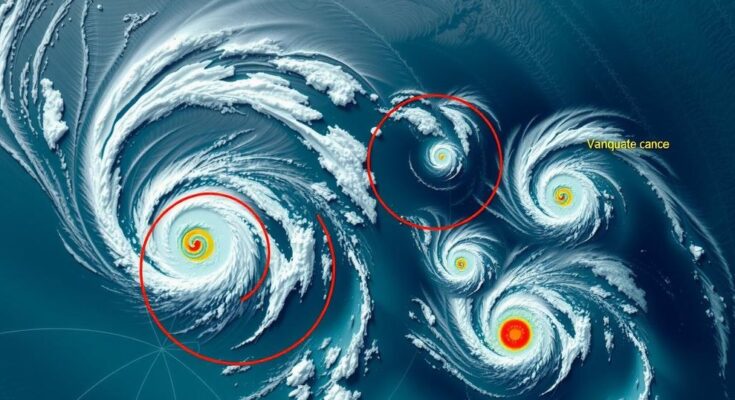Mayotte faces catastrophic damage from Cyclone Chido, the worst storm in 90 years, with wind speeds over 225 km/h affecting the poorest communities. Concurrently, Vanuatu experiences a 7.3 magnitude earthquake, causing landslides near a critical shipping facility. Both events highlight the vulnerabilities of island territories to natural disasters.
Residents of Mayotte are grappling with devastating consequences following Cyclone Chido, which has been described as the worst storm to impact the French Indian Ocean territory in ninety years. Wind speeds exceeding 225 kilometers per hour have wreaked havoc, particularly in impoverished areas represented by flimsy sheet-metal roof shelters that could not withstand the cyclone’s force. Meanwhile, Vanuatu has been struck by a powerful earthquake measuring 7.3 on the Richter scale, leading to landslides near the international shipping terminal and raising concerns about additional aftershocks and ongoing safety risks for the local population.
Cyclone Chido has devastated Mayotte, an island located in the Indian Ocean, which is a territory of France. Such extreme weather events are increasingly being linked to climate change, a growing concern for many regions prone to tropical storms. At the same time, Vanuatu, situated in the Pacific Ocean, is vulnerable to seismic activity, with earthquakes occurring frequently in this tectonically active region. The simultaneous occurrence of a cyclone and a significant earthquake underscores the various natural disaster risks faced by island nations and territories.
In conclusion, the destructive power of Cyclone Chido in Mayotte and the magnitude 7.3 earthquake in Vanuatu illustrate the urgent need for improved disaster preparedness and response mechanisms in vulnerable regions. The severity of these events calls for immediate humanitarian aid and long-term strategies to enhance resilience against future natural disasters. As climate patterns shift, such catastrophic occurrences are likely to become more common, necessitating a global response to address the risks associated with climate change and geological instability.
Original Source: www.ndtv.com




